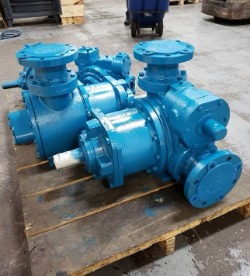Quick quiz: how many seven-letter words in the English language consecutively use the letters “phth” in their construction? Answer: Two, with one of those being “naphtha,” which is derived from the ancient Middle Persian word for “wet” and today is defined as “a flammable oil containing various hydrocarbons, obtained by the dry distillation of organic substances such as coal, shale or petroleum.” (For those who need to know, the second seven-letter “phth” word is “aphthae” – you can look it up.)
So, while the word “naphtha” is extremely rare in its construction, it is also extremely versatile when used in industrial applications. In fact, its range of uses spans from hydrocarbon-cracking processes to the manufacture of laundry soaps, cleaning fluids, varnishes, fuel for camp stoves and as a solvent for paint.
At Blackmer®, however, naphtha has one specific use. When you buy a new Blackmer Sliding Vane Pump (with the exception of the CRL Series and any stainless-steel pumps) or a related accessory product like a Bypass Valve, if you take off one of the port caps, you will notice that there is residual fluid inside the device. This fluid is naphtha and it is there because it was used to perform a very specific job: to act as a test fluid before the pump is shipped to the end user.

Naphtha excels in its test-fluid role because it has low viscosity and low vapor pressure but with a high flash point, and, maybe most crucially, it prevents oxidation. This means that the use of naphtha protects the pump’s internals from rusting as it is being shipped to its final destination. In addition, the anti-oxidation properties of naphtha allow customers to store a Blackmer pump on the shelf and have it ready when they need it. Naphtha is also safe to work with when the guidelines on the fluid manufacturer’s Material Safety Data Sheet (MSDS) are followed.
Additionally, since most of the production-testing, endurance-testing and cycle-testing rigs at the Blackmer manufacturing facility in Grand Rapids, MI, draw from a liquid-supply tank that is located below the pump, the test liquid – i.e., naphtha – plays a role in proving the pump’s suction-lift capabilities. In fact, all Blackmer sliding vane pump models are well suited for suction-lift applications, and this is proven during the 24-hour, six-days-a-week manufacturing processes that take place at the PSG Grand Rapids facility, processes that would not be complete without the unique test-liquid abilities of naphtha.
Please visit blackmer.com to learn more about its full portfolio of sliding vane pumps and how testing them with naphtha can help optimize the pump’s performance.